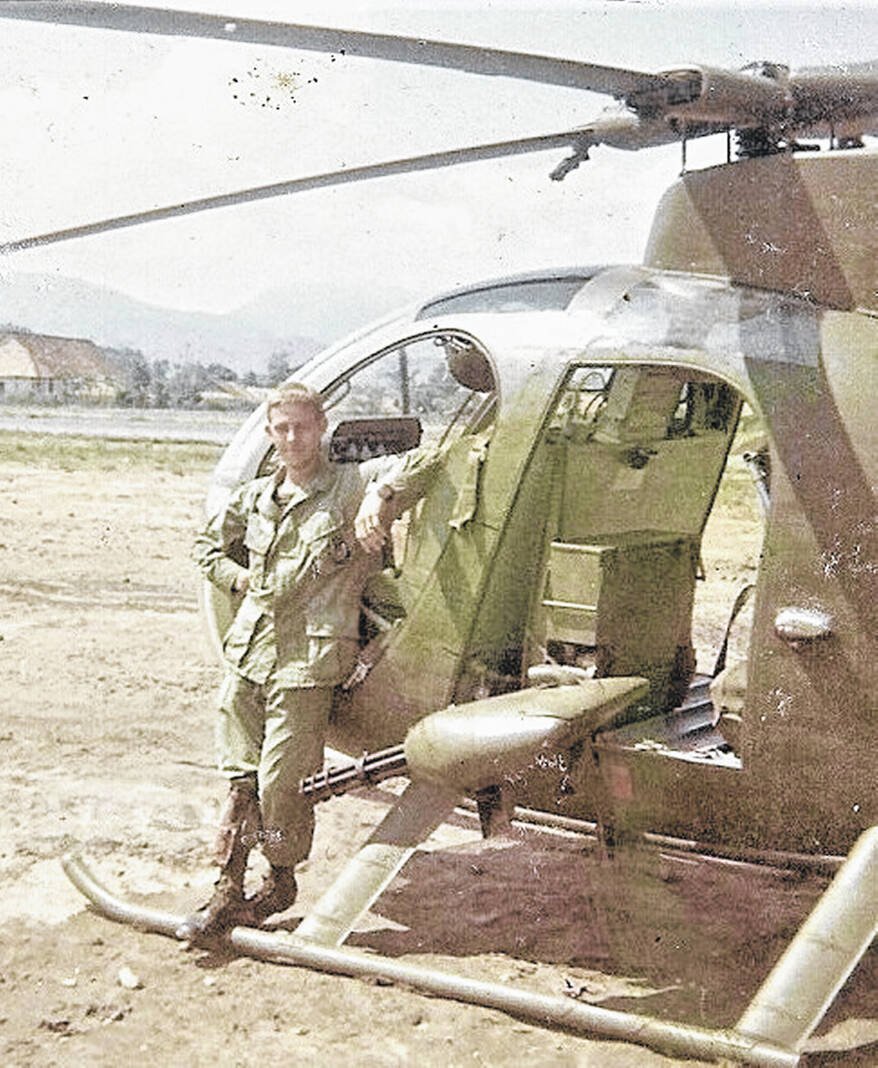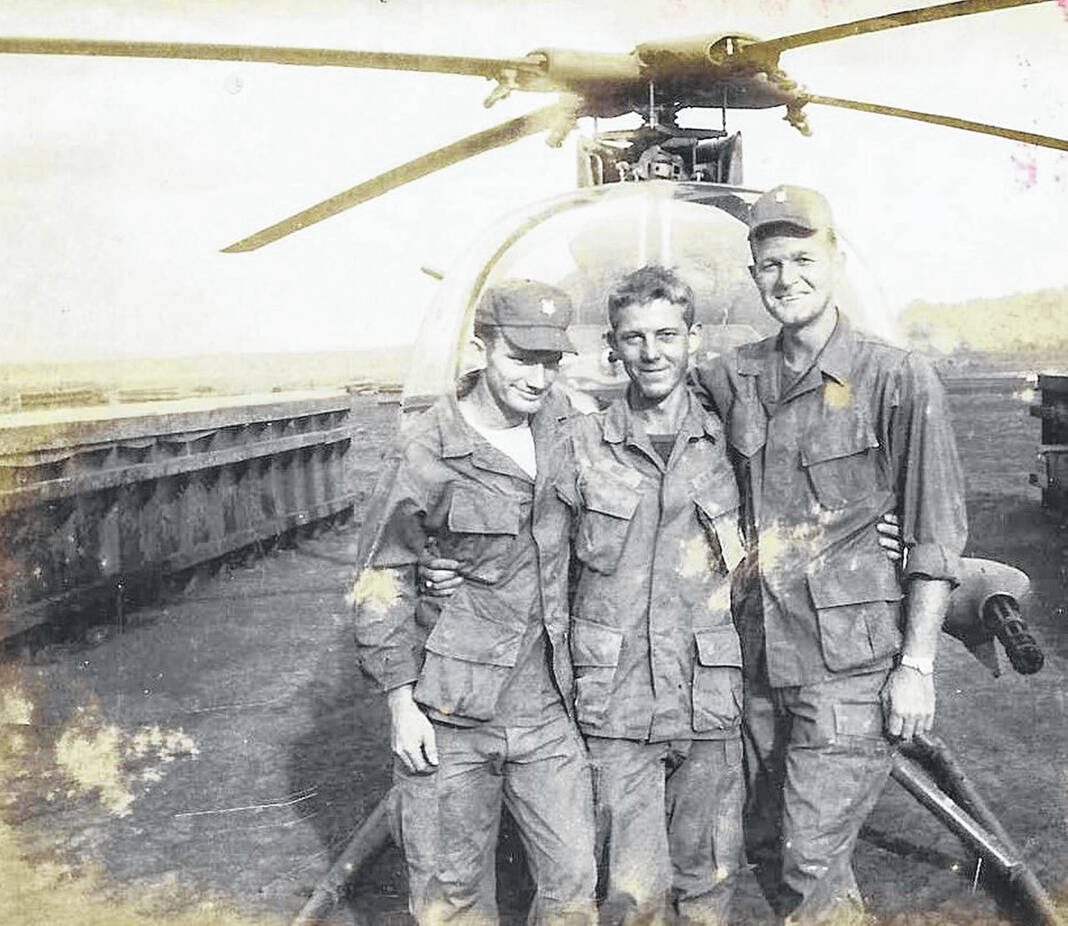
Jack Rose with a “Loach” (light observation helicopter).

Jack Rose is in the middle of this photo. At left is Fellow Scout Henry Jackson, who died two years after being discharged due to wounds suffered in action. At right is Tony Bowers, who died from the effects of Agent Orange.
Editor’s Note: This is Part 1 of an article by local military veteran Paul Butler, who writes periodic stories on Clinton County veterans for the News Journal.
It’s August 12, 1947. John M. Rose is a farmer in Brown County and he’s working in his fields like most farmers.
But his wife, the former Della Huddleston, is lying on their kitchen table with a midwife at her side. She is giving birth to the young couple’s third child, John “Jack” Milton Rose II, who will also be welcomed by his two sisters, Jane and Leann. Another son, Robert “Bob” would round out the Rose family before they settled on SR 134 outside Wilmington in 1953.
Young Jack began his education at Main Elementary School, continuing at Smith Place and on to Wilmington Junior High, graduating from Wilmington High School in 1966.
Like a lot of older boys in the 1960s, his extracurricular activities turned to cars rather than his junior high times where he played football and trumpet in the band. Industrial arts/automotive, was his favorite class and working on cars after school replaced football.
As required by law, Jack registered for the draft on his 18th birthday, August 12, 1965.
Just over a year later he received his draft notice from Mary Lewis (of the Clinton County Draft Board), then on September 18, 1966 his Mom and Dad dropped him off at the bus station on Sugartree Street and watched him board a bus for Fort Knox, Kentucky.
The bus made several pick-ups/drop-offs before stopping at the Sunset Inn off Route 42 on the banks of the Ohio River, where, Rose says, “I had my ‘Last Supper’” before continuing his journey to Basic Training.
Arriving at Fort Knox around 4 a.m., the new recruits were issued bed clothes, assigned a bunk, and told they could sleep until 5:30 or maybe 6 a.m. Tired and confused, the next morning Jack received new clothes, a haircut, and many shots with the dreaded air gun — while being yelled at the whole time.
Welcome to boot camp
He graduated from basic training and was off to Advanced Individual Training (AIT) with an armor unit, also at Fort Knox. Doing his AIT so close to home was a bonus, especially when everyone was saying,“You are training for duty in Vietnam.” But, good news followed his AIT.
He was assigned to the historic 17th Cavalry Regiment, based then in Fort Knox, which formed in 1916 and gained its early fame from its operations on the Arizona-Mexico border followed by distinguished service during WW I.
Everything seemed to be working in his favor. Shortly after he was to begin this phase of his training, he was selected to be the Commanding Officer’s driver. This position exempted him from any extra duty such as KP, and his working hours were great.
It was starting to look like duty in Vietnam was not in his future. Like many soldiers, Jack thought the longer he was in training, the more likely the war would be over before he got orders to go, or maybe he would be sent to Germany or assigned as Permanent Company at Fort Knox.
But on October 16, 1967, Rose was boarding a plane for San Francisco to board a waiting troop transport ship.
Jack’s entire company was headed for Vietnam.
‘Home’ aboard ship
Rose and the friends he had made during the last year were about to board the Merchant Marine vessel, the SS Nathaniel
Walker, that would become their home for the next 17 days.
Thinking back, Rose said: “I can’t remember a day I wasn’t seasick.” He also recalls the boredom of the trip and playing Acey Deucy a lot of the time and lamenting about how much money he lost. Since no one had any cash with them, they played “Pay Day Stakes”, meaning you didn’t have to pay off your losses until you got paid.
Another memorable experience was the hard time he had getting into his hammock at night. They were stacked four high and, of course, his was the one on top. After one-night stay in Subic Bay, Philippines and a night on the town with a bunch of sailors, it was off to their eventual destination, where they hit some horrific weather, exasperating the seasickness.
Finally, with both feet on terra firma, though hostile: “It’s better than the top hammock on a troop ship”, Rose thought — for only a short while.
His Company spent a couple days in Qui Nhon, Vietnam waiting for transportation to their assigned base camp, Pleiku. While there at Camp Enari, at the base of Dragon Mountain, his Commander, Major Carver, once again wanted him for his driver.
A death wish?
When the Major was wounded by a round from an AK 47, he was rotated back to the States and a Major Inglett took over as Commander for a short time. When he was given another assignment, he asked Rose if he could do anything for him.
Jack replied: “I want in the Scout Platoon”, to which the Major responded: “Do you have a death wish?” Scouts only had a 30-second life expectancy in Vietnam.
Inglett continued: “Did you get some bad news from home?”
Jack answered: “No Sir, I just want to interview for the Scouts.”
In order to qualify for the Scout Platoon, Jack had to pass a flight physical and a psychological exam as well as interviews with the Commander, Sgt. Bright and other Scouts in the platoon.
Rose’s AIT training was with the 50-caliber machine gun in half-tracks and Jeeps. He was accepted and promoted to Sgt. E-5.
The platoon consisted of eight Scouts who all occupied the same quarters, referred to as a Hooch. Jack remarked, “There was very seldom all eight in the Hooch at the same time, because of the number of them Killed In Action (KIA).”
When the monsoons came they had to move to Ban Me Thuot. The platoon named their new home “Fort Bleakness” as they had to live in tents, in the mud on an Army of the Republic of Vietnam (ARVN) base rumored that 50 percent of the troops stationed there were actually Viet Cong (VC).
One night the VC ran through the camp throwing hand grenades in the tents of the sleeping U.S. soldiers.
Jack, somehow, was spared from all the bullets sent his way, unlike so many in his platoon — but some wounds incurred in combat don’t leave a visible scar.
To be continued…
The writer, Paul Butler, is a Wilmington resident, U.S. Navy veteran, and a Class of 2020 inductee of the Ohio Veterans Hall of Fame.
In September 2020, Clinton County recognized Paul for his “dedication and commitment in military service as well as his exceptional post military advocacy and volunteerism for the veteran community.” A 2020 News Journal article called him “the voice and the fountain pen for Clinton County veterans organizations and related projects.”

